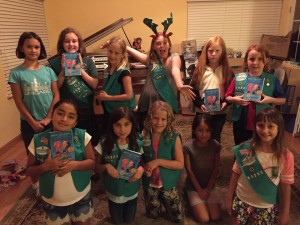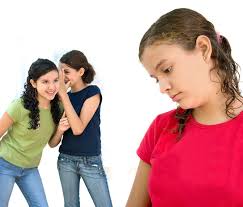|
|
November 7, 2015
 We’ve got the tools and we’re brave enough to use ’em! Last month I began partnering with the Girl Scouts of Northern California by presenting my Girls Friendship without the Drama Workshops. In the first hour I teach girls to navigate all kinds of sticky peer conflicts while the moms (and the few cool dads who’ve shown up) sit back, listen and observe. During the second hour the girls skedaddle into another room where they engage in more (supervised) friendship-building skills while the parents and I circle the wagons and get to the heart of what girls need from those of us who love them.
To date I’ve done nine of these workshops with another seven scheduled. Girls can’t wait to start using what they’ve learned. Moms are reminded how painful it can be feel “replaced” by a friend. Dads are stunned at how hard it is for girls to tell a friend, “Stop. I don’t like that.” Parents are thrilled to have new insight, language, and context to help their daughters do a better job navigating friendships.
Here are some tips to help you help your daughters and sons resolve the inevitable issues that come up between our kids and their peers.
Dealing with Friendship Challenges
- Calm Down. No matter what awful thing some child has done to your daughter or son, calming down first makes it easier to get through the upset. So take some slow deep breaths and encourage your child to do the same.
- Show that you get it. Acknowledge that it hurts when a friend turns against you. Reflect back what you hear, “You sound really hurt, angry, and confused.” Share one of your own “hurt by a friend” stories. Share what you learned and how you used it to become a more thoughtful person and a better friend. This models empathy and reassures your child that (s)he will survive.
- What Can/Can’t You Control? Tell your child, “You can’t control a friend’s behavior or feelings, but you can get a handle on your own.” When we try to control things we can’t control, it stresses us out and makes us feel powerless. Don’t let your kid go there!
- You’ve got options! Even after a blow-up with a bff, your child is far from powerless. She always has options. For example, your child might:
- Never talk to that friend again
- Get back at her by spreading gossip
- Suppress the hurt and act like it didn’t bother you
- Find new friends
Brainstorming should be open-ended. Encourage your child to freely explore ideas without your judging them. They’re just ideas and this is a clearing process. Even the worst, knee-jerk options offer great (and totally safe) learning opportunities. In addition, you’ll give your child a gift by talking about all of this. When s/he doesn’t have to worry about your rushing in to “fix” the problem, your child’s thinking process will be accelerated. Hopefully, she’ll move closer to the time when she no longer accepts disrespectful behavior from anyone, including herself!
At the end of the process your child may decide to take a vacation from the drama or to find the EXIT out of the friendship. That’s her choice. But just because she’s finished, doesn’t mean she has the right to make life unhappy for an ex-friend. I put it is this way: You have the right to choose your friends, but it’s NEVER okay to be cruel or disrespectful. Keep your distance if you choose, but always treat others the way you want to be treated. Old rule. Still applies.

August 21, 2015
 “Why doesn’t she want to be my friend anymore?” Today’s question comes from the mom of a 12-year-old who is feeling her daughter’s pain at being rejected by a long-time bff.
How can I help my daughter deal with rejection? Her friend of six years has a new best friend. My daughter is hurt and desperately trying to win her friend back. What can I do to help her accept that sometimes friends move on?
Rejection comes up a lot in life, so we get lots of practice dealing with it. Either we didn’t get chosen for the team or didn’t get into the school we wanted or didn’t get the job we interviewed for. These are as “institutional” rejections. They sting, but at least they are not truly personal. This 12-year-old is grappling with a very personal form of rejection, being ditched by a close friend who has moved on into the embrace of a new bff. Ouch!
When we talk to our kids about feelings of rejection it’s important to give them a chance to talk about it. “I feel bad! What did I do wrong? Why doesn’t she want to be my friend any more?!” These aren’t necessarily questions that require answers from you. A child asking these questions is most helped by a parent who listens with compassion and patience and understanding. But when this girl talks to Mom about “trying to win her friend back” that is when a parent ought to do more than listen and empathize.
The daughter seems to believe she can change her friend’s mind. Mom can help by providing a reality check (compassionately, of course). Mom needs to tell her there are certain things in life that we can control and certain things we can’t. In the area of what we can’t control: the thoughts, feelings and behavior of other people. In the area of what we can control: our response to what’s going on inside and out.
If someone were to kick me in the shins, I’d yell “Ow!” because it hurt. If someone says, “I don’t want to be your friend” that’s going to hurt, too. But how long will it hurt? And how many times will I play over in my mind those hurtful words? If I’m a healthy, resilient child or adult, I won’t replay it much. Why re-hash something when the hash didn’t taste great to begin with?
Talk to your children about the concept of re-hashing negative thoughts and mental movies. Then say to your child, “Sweetheart, you already have what it takes to be a good friend. You were Emma’s best friend for six years! And that is a great accomplishment. But friendships don’t always last forever.” Now would be a good time to remind your child of the friend she was close to in preschool or third grade who, now in sixth grade, is no longer a close friend. That might help her understand the evolution of feelings and friendships.
My best advice for helping children dealing with rejection:
a) Let kids express how they feel without your interrupting, correcting, or invalidating those feelings.
b) Prompt kids to think and talk about what, if anything, they might have done to contribute to the rejection. Relationships are a two-way street and it’s good for them to acknowledge what they might have done or failed to do to keep the friendship healthy and strong.
c) Brainstorm with kids about how they might respond next time they are rejected. It’s important for them to recognize they always have options in the way they behave.
d) Encourage them to think about a candidate who might become their next best friend.
These conversations will empower your child. It will also strengthen your bond and help your child become more resilient.

July 30, 2015
 What’s wrong with you? Can’t you take a joke?! For better or for worse, our tweens and teens spend immeasurably more time with their friends than we did at their age. UOK wid dat? If we allow it, digital access enables them to connect every waking hour. These interactions strengthen interpersonal skills as often as they undermine them. Our kids must learn to set boundaries with other kids so they’ll develop confidence in who they are and what they need in a relationship.
Today’s question comes from a parent whose 10-year-old daughter has two challenging friendships.
Friend A says things to my daughter that undermine her confidence (“Everyone knows your writing sucks.”) but then laughs it off as a joke. Friend B is very sweet and kind, but too clingy. She always wants to do whatever my daughter does. Are there phrases she could use to help her tell the bitchy chick to change or go away, and to tell the lovely friend to be more independent?
– Frustrated Mom
Setting boundaries is something we all have to learn, because we need to teach people how to treat us. When we stay silent in the face of insults or we laugh along with the people mocking us, we send this message: “It’s OK for you to put me down.” Since that’s not the message your daughter wants to send, she needs to speak up for herself.
When Friend A makes nasty comments then hides behind “Just kidding!” your daughter needs confidence to let the girl know she just “crossed the line.” Ah, but how?
Many girls equate challenging a friend with being “mean” and that’s part of the reason they avoid “confrontations.” Make sure your daughter understands this isn’t a confrontation, it’s a respectful communication. Let her also know that standing up for herself (or others) doesn’t make her “mean” it makes her brave.
Advise your girl to stay calm and strong while she makes eye-contact, and simply speaks the truth. She might say something like this to Friend A: “That didn’t feel like ‘kidding’ to me. It hurts. If you’re really my friend, you won’t do that again.” Now Friend A has been put on notice and your daughter has taken back her power. If your daughter needs help saying these words, role play with her until she feels ready for the conversation. Hopefully this will work. If Friend A continues to make cutting remarks, then your daughter will have to continue standing up for herself and/or find the EXIT to this friendship.
In the case of “too clingy” Friend B… that’s a bit trickier. Your daughter has the right to choose who she spends time with but she doesn’t ever have the right to intentionally hurt anyone. (Remind her how it feels to be on the receiving end of one of Friend A’s zingers.) But that doesn’t mean she must continue to allow herself to be smothered in her clingy friend’s embrace. She might say something like this to Friend B: “I like spending some time with you but not all the time. I want to spend time with other friends, too. So today, let’s hang out together during lunch recess. Then tomorrow I’m going to hang out with Friend C.” That’s a clear communication and it is sensitive and respectful. Friend B may not be happy to hear that she won’t be with your daughter tomorrow, but if your daughter stays calm and delivers the message clearly and confidently, Friend B will (eventually) figure out that she needs to widen her friendship circle.

June 6, 2015
For the next few months my blog will focus on answering your parenting questions about raising tweens and teens as well as letting you in on some of the letters I get from tweens and teens. So if you’ve got something on your mind that you could use help with, send it to AskAnnie. (Of course it will be posted without any names, so no worries there.)
Today’s question: How do I keep my 11 yr old away from a bad friend?
 And you still think she’s your friend?! First you’ve got to realize that your definition of a “bad” friend might not be the same as your child’s. In fact, if your child has a history with this friend and is very attached, trying to pry her away will most likely land you smack in the middle of an ugly, pointless power struggle in which you will become the bad guy.
The most effective way to handle something like this is to help your child develop standards for what constitutes a good friend vs. the other kind. You can do it by making observations about what you see. For example, you might say, in a neutral voice, “You know, honey, I’ve noticed, when you come home from Jack’s house you’re usually in a bad mood. Sometimes you take it out on your sister. Sometimes you’re rude to me. I’m wondering what’s going on here?” Right then and there, you create a safe environment for your child to think about what you’ve observed and to let you in on where this chronic “bad mood after being with Jack” might be coming from.
Another approach is to share what you see when the two kids are together. You might say something like this, “I notice when Jack comes over, he seems to be bossing you around. Sometimes I hear bad language and I’m not happy with that. It seems like you two spend more time fighting than getting along. What’s up with that?” After an observational statement like this, simply close your mouth and listen to what your son or daughter has to say.
These techniques let you inside the mind of your child more effectively than provocative statements. (“You don’t actually like that awful boy, do you?!!”) Loaded questions like that don’t go over well with tweens and teens.
If you have good reasons, you are also perfectly within your rights to say, “Your friend is no longer welcome in our home and here’s why…” That conversation can be an eye-opener for your child and provide lots of food for thought.
Bottom line, the best way to influence tweens and teens in the direction of more positive friendships is to make neutral observations so the conversation can open up rather than shut down. That’s how to infuse your child with essential information about what it means to be a real friend.
I hope this helps. And until next time, happy parenting.

| |















